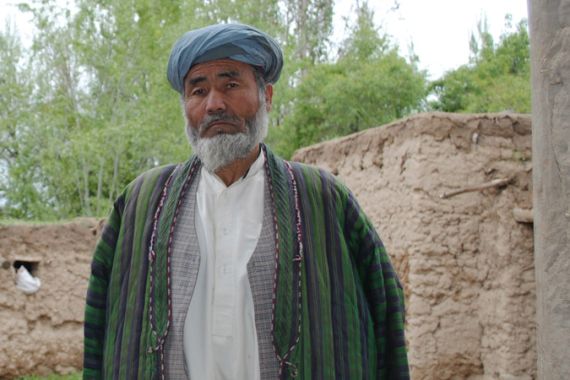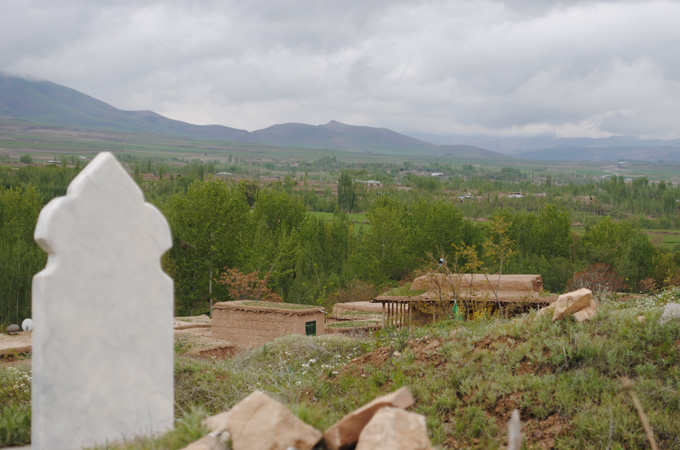Iran executions anger Afghan families
Dozens of Afghans have been executed in recent months across the border in Iran, mostly for drug related offences.

Zir-e Shakh, Afghanistan – The grieving mother of 21-year-old Kamal Uddin weeps in the doorway as village elders recite verses from the Quran on the second floor of the family’s mud-brick home in northern Afghanistan.
Kamal left four years ago to find work in Iran, just like many other ethnic Tajiks from the impoverished village of Zir-e Shakh in Takhar province’s Kalafgan district, 260 kilometres north of the capital Kabul.
Imprisoned on drug charges in Iran’s notorious Vakilabad prison in the city of Mashhad, Kamal was hanged late last year – about the same time Iranian authorities are accused of resuming mass executions of prisoners – many for minor crimes such as drug possession.
Kamal’s father, Mullah Mohammad Youssef, received word of his son’s death through friends.Youssef says the last time he spoke to his son was a year ago.
“He convinced me that he would be released soon. He said to me, ‘Dear father, don’t worry about me.'”
Youssef tried several times to get his son’s body back, but the Iranian government refused to hand it over, he says.
“No one can bring back corpses from Vakilabad prison,” Youssef told Al Jazeera. “Other prisons give the body back. Only Vakilabad’s rules are different. I have no idea why.”
|
“Of course the dead bodies from Iran are increasing. But most of the bodies are buried in Iran. Poor families can’t afford to bring the bodies back.“ – Shamsurham, Zir-e Shakh villager |
Human rights groups estimate more than 4,000 Afghans are currently on death row in Iran, most for drug-related offences. Village elders here say they have compiled a list of more than 100 names of those executed in the past six months, 80 of those bodies have been returned.
The majority of Afghans are locked up in Mashhad’s Vakilabad prison. Others are incarcerated at the Ghezel Hesar prison in Karaj, west of the Iranian capital Tehran, and the Kerman and Zahedan’s central prisons also hold a large number of Afghans, says Mahmood Amiry-Moghaddam, Iran Human Rights (IHR) spokesman in Norway.
Schoolteacher Qari Mohammad Amin told Al Jazeera he recently travelled to Iran to gather his brother Habibullah’s body, after he too was executed on drug charges. Amin’s wife said the body was badly bruised from beatings.
“Of course the dead bodies from Iran are increasing,” said local villager Shamsurham, 32, who gave only one name. “But most of the bodies are buried in Iran. Poor families can’t afford to bring the bodies back.”
‘No one’s listening’
Only China executes more people each year than Iran. Norway-based Iran Human Rights, a group that documents executions in the country, says at least 580 people were executed there in 2012.
The United Nations said in February that the pace of executions in Iran had been stepped up over recent months. “The Secretary-General remains deeply troubled by reports of increasing numbers of executions, including of juvenile offenders and in public,” a UN report said.
Iranian officials, however, have vehemently denied the allegations. The secretary-general of Iran’s High Council for Human Rights, Mohammad-Javad Larijani, said the UN report was “propaganda” and “baseless”, adding it used “a totally unacceptable methodology”.
Because of international media coverage, mass executions in Iran stopped in 2011, but they resumed in October 2012 as the limelight faded, said Amiry-Moghaddam.
“This issue of the Iranian regime executing Afghans is getting worse day-by-day,” said Baktash Siawash, a Kabul-based parliamentarian. “They are carrying out systematic and gross violations of human rights in the country under the pretext of Islamic law – and no one’s listening to Afghan’s voices.”
 |
| The grave of an executed Afghan in Zir-e Shakh cemetery [Bethany Matta/Al Jazeera] |
Siawash told Al Jazeera he believes part of the reason Afghans are being targeted is because of Kabul’s close ties to Washington – one of Iran’s main antagonists.
“We’re concerned that after the signing of the security partnership with the United States, the regime [in Tehran] will put more pressure and take more action against Afghan citizens in Iran,” he said.
Death for drugs
About 76 percent of executions in Iran are drug-related, and torture is often used to extract forced confessions, said Amiry-Moghaddam.
Heather Barr of Human Rights Watch (HRW) told Al Jazeera due process was lacking for those facing capital murder cases in Iran, and its widespread use of the death penalty for drug offenses is not in line with international standards.
“People won’t have had a fair trial, have had access to free council, and won’t have received assistance from their embassy if they’re foreigners,” Barr said.
It remains unclear why Iranian authorities have stepped up executions – many of them carried out in public with groups of 10 prisoners hanged to death.
Amiry-Moghaddam said one explanation may be prison overcrowding. Vakilabad prison has a capacity of 3,000 inmates, but in 2011 it housed 13,000 inmates, according to an official report.
IHR said reports indicate the prison was holding as many as 20,000 prisoners in 2012.
Speaking at the UN in November 2011, the secretary general of the Iranian Judiciary’s High Council for Human Rights, Mohammad Javad Larijani, discussed limiting the use of the death penalty.
“I think there are ways to bring down the number of executions. More than 74 percent of executions in Iran are stemming from drug trafficking related crimes,” Larijani said. “Whether it is correct or not, there is a big question: ‘Did this harsh punishment bring the crimes down or not?’ In fact, [it] did not bring it down.”
One of the grim ironies over Iran’s executions is the support the country receives to fight the drug trade within its borders from the UN and international donors that abhor the death penalty.
The United Nations Office on Drugs and Crime (UNODC) has praised Iran for its tough anti-drug policies, and many European countries fund its drug-control programme, which ultimately leads to many executionsfor often minor narcotics offenses.
|
“Indeed we discussed the executions of Afghans. This was a first priority issue because Afghans are facing harsh conditions there.“ – Zabiullah Mujahid, Taliban spokesman |
“In spite of widespread reports of these human rights abuses, UNODC and donor countries have continued to give millions of dollars to the governments of Iran, Afghanistan, and Pakistan in the name of combating drug trafficking,” said HRW’s Rebecca Schleifer.
Critics have called for a halt to such funding. Denmark, one of several Western countries providing funds to the UNODC that finds its way to Iran, stopped in April.
Stay home
Community elders and mullahs back in Zir-e Shakh told Al Jazeera they’ve advised young people not to go to Iran, despite the better economic opportunities across the border.
“Over a thousand times we’ve tried to prevent them, but they don’t listen,” said Zai Uddin, a local elder. “We have protested, gone to Kabul to talk with top officials … Whatever we do, there is no result.”
Many Afghans have criticised their government for failing to hold Tehran accountable for Afghans being executed.
“Iran pays money to the president’s [Hamad Karzai’s] office, they have admitted this themselves,” said Kamal Sadat, a political analyst. “So when you take money … you obviously can’t stand up to that government.”
Months ago at a media briefing, Afghanistan’s Foreign Ministry spokesman Janan Mosazai told reporters a delegation would be visiting Tehran in the near future to find a “lasting solution” to the growing problem of Afghans being executed.
Mosazai declined to comment when asked about the executions and if a delegation had ever been sent. Iran’s Embassy in Kabul also said it would not discuss the issue.
The Taliban, meanwhile, say they’ve approached Iranian authorities about the executions.
“We mentioned all the problems Afghan refugees are facing in Iran,” Taliban spokesman Zabiullah Mujahid told Al Jazeera. “Indeed we discussed the executions of Afghans. This was a first priority issue because Afghans are facing harsh conditions there.”
In Zir-e Shakh, Youssef said he is leaving for Iran soon to see his son Kamal’s grave. He said he will also visit his eldest son – who is still imprisoned in Iran on drug charges – and Kamal’s Iranian wife. Before Kamal was jailed he got married, and prior to his death by hanging the couple had a daughter.
“He will never see his baby,” said Youssef shaking his head in distress. “It’s terrible.”